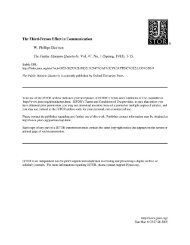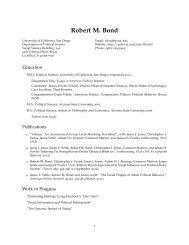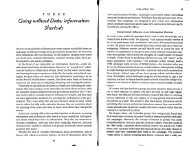Chapter 6 Why Authoritarian Parties? The Regime Party as an ...
Chapter 6 Why Authoritarian Parties? The Regime Party as an ...
Chapter 6 Why Authoritarian Parties? The Regime Party as an ...
You also want an ePaper? Increase the reach of your titles
YUMPU automatically turns print PDFs into web optimized ePapers that Google loves.
CHAPTER 6<br />
or dismissal of thous<strong>an</strong>ds of senior elected <strong>an</strong>d administrative posts raises <strong>an</strong> import<strong>an</strong>t<br />
question about the credibility of retirement rules: <strong>Why</strong> don’t the senior party r<strong>an</strong>ks simply<br />
attempt to stay?<br />
A quick but inadequate <strong>an</strong>swer is that the senior r<strong>an</strong>ks retire because the regime’s lead-<br />
ership tells them to go. Gorbachev initiated a large-scale retirement of senior party cadres<br />
in the Communist <strong>Party</strong>’s Central Committee <strong>an</strong>d throughout the Soviet administration<br />
after years of “stagnation” under Brezhnev (Mawdsley <strong>an</strong>d White 2000, <strong>Chapter</strong> 6), <strong>an</strong>d<br />
Lee Ku<strong>an</strong> Yew steadily pressured for “leadership renewal” throughout the People’s Action<br />
<strong>Party</strong>’s existence (Hong <strong>an</strong>d Hu<strong>an</strong>g 2008, 101-107). Stalin’s Great Purge <strong>an</strong>d Mao’s Cultural<br />
Revolution may in part be interpreted <strong>as</strong> <strong>an</strong> exceedingly ruthless way of replacing old by new<br />
party cadres (Rigby 1968; MacFarquhar <strong>an</strong>d Schoenhals 2006). But <strong>an</strong> <strong>an</strong>swer that stops<br />
with the regime’s leadership is incomplete because it only begs the question of why a leader<br />
would feel compelled to retire senior party cadres.<br />
<strong>The</strong> present model shows that incentives for party service among the junior r<strong>an</strong>ks are<br />
inextricably tied to the promise of a promotion, which in turn depends on <strong>an</strong> appropriate<br />
rate of retirement among the senior r<strong>an</strong>ks. At the same time, however, the benefits that<br />
senior party members enjoy depend on the continuing survival of the regime, <strong>an</strong>d in turn,<br />
on the junior r<strong>an</strong>ks’ party service. Hence the credibility of the leadership’s promise to retire<br />
the senior r<strong>an</strong>ks rests on the indispensability of party service for the survival of the regime.<br />
If the senior r<strong>an</strong>ks retire at a lower rate or refuse to retire, the motivation to provide costly<br />
party service among <strong>as</strong>piring <strong>an</strong>d junior party members will diminish or disappear. That is,<br />
poral power-sharing among the Mexic<strong>an</strong> elites. In fact, with the exception of Mexico <strong>an</strong>d potentially China<br />
since Ji<strong>an</strong>g Zemin, there are no single or domin<strong>an</strong>t party dictatorships with fixed <strong>an</strong>d effective term-limits<br />
for the leadership.<br />
25











